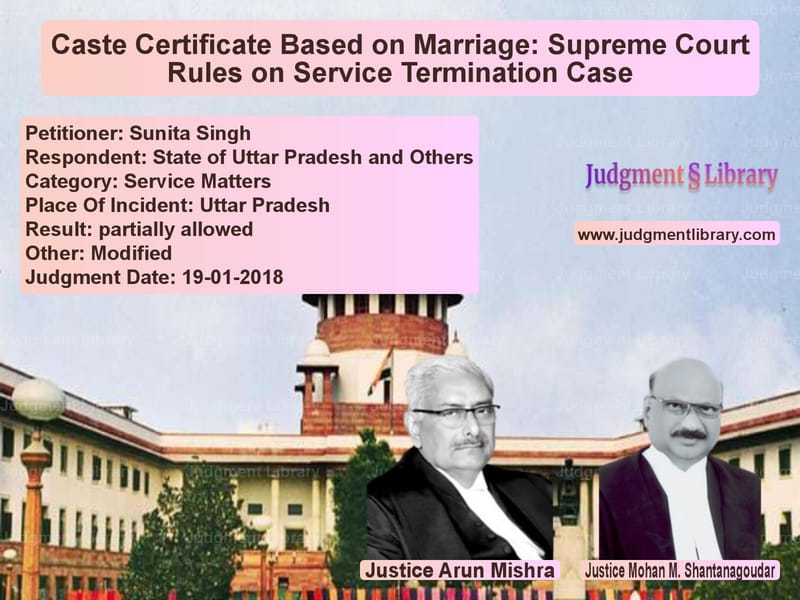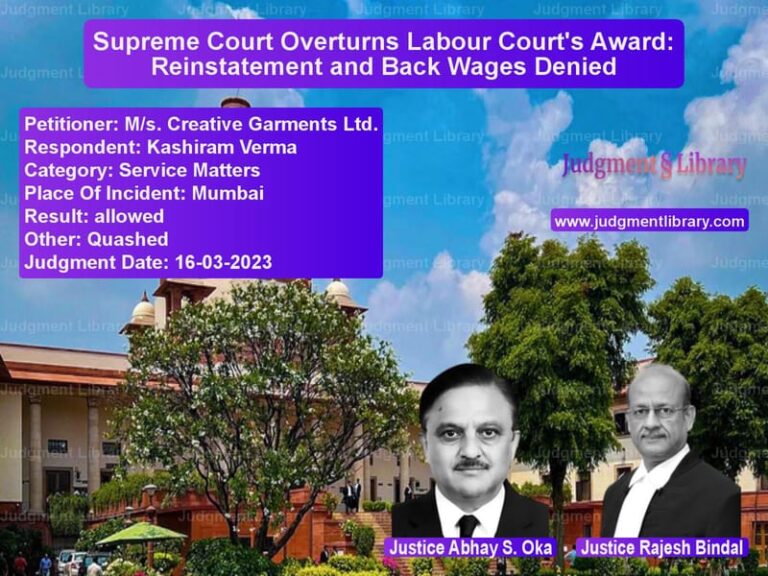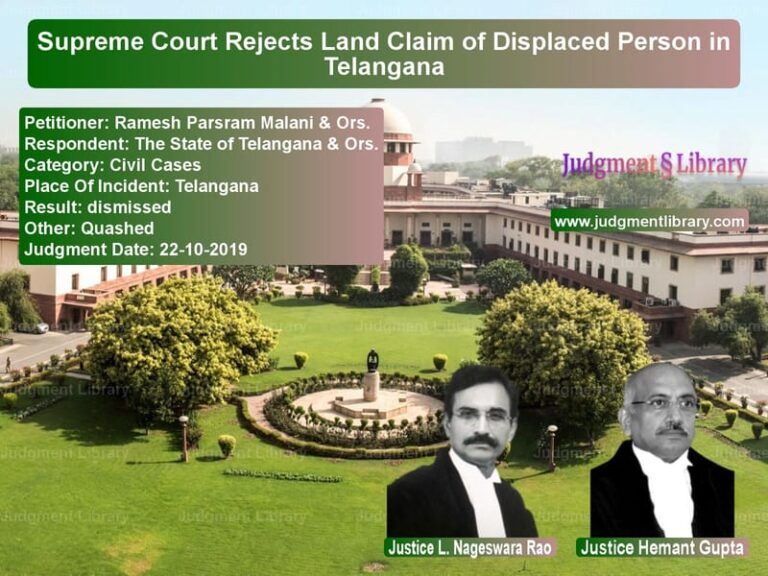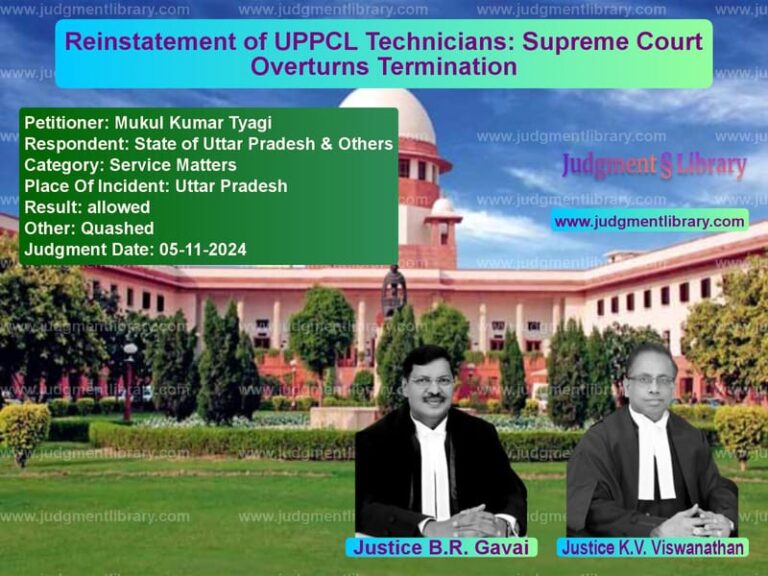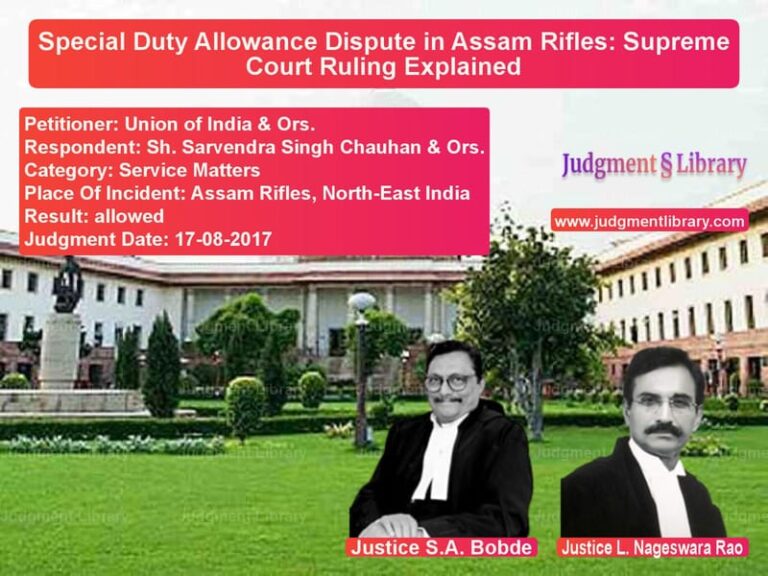Caste Certificate Based on Marriage: Supreme Court Rules on Service Termination Case
The Supreme Court of India, in the case of Sunita Singh vs. State of Uttar Pradesh & Others, addressed a crucial legal issue regarding caste-based reservations and whether a person’s caste can change through marriage. The case involved the termination of a school teacher who had obtained a Scheduled Caste certificate after marrying a Scheduled Caste person, despite being born into a general category family. The ruling clarifies the legal position on caste determination and its implications for government employment.
Background of the Case
The appellant, Sunita Singh, was born into an “Agarwal” family, which belongs to the general category. She later married Dr. Veer Singh, a member of the Jatav community, which is recognized as a Scheduled Caste (SC) in Uttar Pradesh. Following her marriage, Sunita Singh obtained an SC certificate on 29.11.1991 from the District Magistrate of Bulandshahar, certifying her as a member of the Jatav community.
Based on this caste certificate, she secured employment as a Post Graduate Teacher (Hindi) at Kendriya Vidyalaya No.1, Pathankot, Punjab, on 16.12.1993. Over the years, she pursued further studies, obtained an M.Ed degree, and served as a teacher for more than 21 years without any complaints against her.
The controversy began when a complaint was lodged alleging that she was originally from a general category and had obtained an SC certificate unlawfully. Following an inquiry, the authorities canceled her caste certificate on 22/27.06.2013, and she was terminated from service on 18.03.2015. Her appeals against the cancellation were dismissed by the appellate authority, the Commissioner of Meerut Division, and later by the State Level Committee.
Key Legal Issues
- Can a person’s caste change through marriage?
- Was the cancellation of the appellant’s caste certificate legally valid?
- Did the authorities follow due process in terminating the appellant’s employment?
- Should leniency be exercised considering her long tenure in service?
Arguments by the Petitioner (Sunita Singh)
Sunita Singh, represented by her counsel, argued:
- She had lawfully obtained the caste certificate and had not committed any fraud or misrepresentation.
- She had served for over two decades with an unblemished record, and her termination was unfair.
- The authorities had knowledge of her high school records showing her original caste but raised no objections at the time of appointment.
- The authorities failed to provide her with an opportunity to explain her position before canceling her caste certificate.
Arguments by the Respondents (State of Uttar Pradesh & Others)
The state authorities defended their decision, stating:
- Caste is determined by birth and cannot be changed by marriage.
- The issuance of the SC certificate to the appellant was illegal and required cancellation.
- The appellant had obtained employment under the SC category despite belonging to a general caste, making her appointment invalid.
- The termination was justified as per government service rules once the caste certificate was declared invalid.
Supreme Court’s Observations
The Supreme Court carefully analyzed the legal principles governing caste-based reservations and service terminations. The Court made the following key observations:
- “There cannot be any dispute that caste is determined by birth and cannot be changed by marriage with a person of Scheduled Caste.”
- “Merely because her husband belongs to a Scheduled Caste category, the appellant should not have been issued an SC certificate.”
- “The authorities were right in canceling the caste certificate and terminating her employment.”
- “However, considering her long tenure and absence of any fraudulent intent, a lenient view is warranted.”
Supreme Court’s Judgment
The Supreme Court upheld the cancellation of Sunita Singh’s caste certificate and ruled that her employment under the SC quota was invalid. However, in an act of leniency under Article 142 of the Constitution, the Court modified her punishment from termination to compulsory retirement. This decision allowed her to receive retirement benefits while acknowledging the wrongful issuance of the caste certificate.
Key Legal Precedents Considered
The Court referred to several important judgments, including:
- R. Kumar vs. State of Maharashtra (2010): Held that caste is determined by birth and not by marriage.
- Madhuri Patil vs. Additional Commissioner (1994): Laid down guidelines for verifying caste certificates.
- G. Dattatraya vs. State of Maharashtra (2017): Affirmed that fraudulent caste certificates warrant cancellation but procedural fairness must be ensured.
Implications of the Judgment
This ruling has significant implications for caste-based reservations and service terminations:
- Caste cannot be acquired through marriage, and caste-based reservations must be strictly based on birth identity.
- Authorities must ensure due diligence while issuing caste certificates to avoid later complications.
- Employees who obtain benefits under an invalid caste certificate may face termination, but courts may consider leniency based on service records.
- The judgment provides clarity on how wrongful caste certificates should be handled without causing undue hardship to individuals.
Conclusion
The Supreme Court’s ruling in Sunita Singh vs. State of Uttar Pradesh & Others sets an important precedent in caste certification cases. The judgment reaffirms that caste is determined by birth and not marriage, while also balancing fairness by preventing undue hardship on individuals with long service records. The ruling emphasizes the need for authorities to act diligently when issuing and verifying caste certificates to ensure that genuine beneficiaries receive rightful reservations.
Don’t miss out on the full details! Download the complete judgment in PDF format below and gain valuable insights instantly!
Download Judgment: Sunita Singh vs State of Uttar Prade Supreme Court of India Judgment Dated 19-01-2018.pdf
Direct Downlaod Judgment: Direct downlaod this Judgment
See all petitions in Employment Disputes
See all petitions in Termination Cases
See all petitions in Judgment by Arun Mishra
See all petitions in Judgment by Mohan M. Shantanagoudar
See all petitions in partially allowed
See all petitions in Modified
See all petitions in supreme court of India judgments January 2018
See all petitions in 2018 judgments
See all posts in Service Matters Category
See all allowed petitions in Service Matters Category
See all Dismissed petitions in Service Matters Category
See all partially allowed petitions in Service Matters Category

